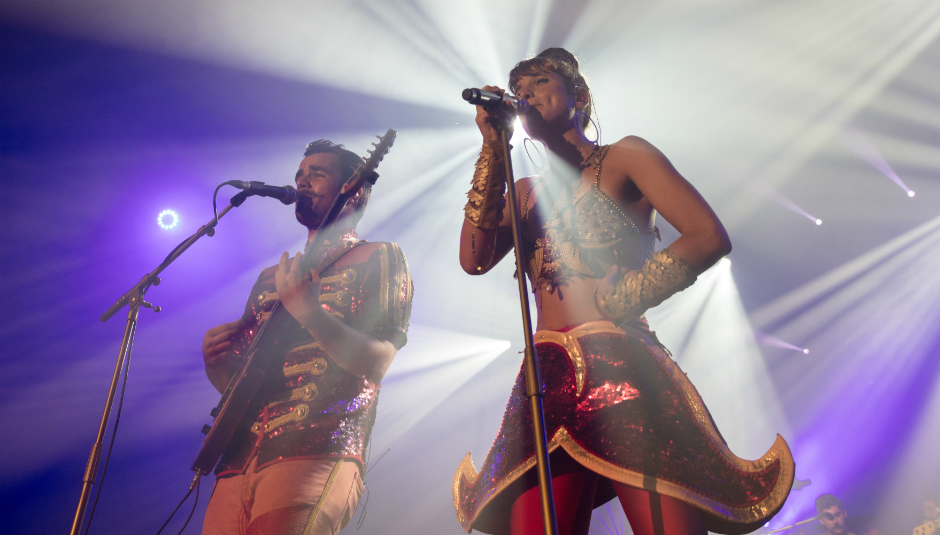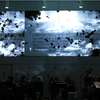Clermont-Ferrand is unlikely territory for a music festival. Sitting in the heart of France, high on the Limagne plain and in the shadow of the Puy de Dôme volcano, this is rugby country. Industry and agriculture dominate here, lending the city and residents a grizzled, hard-bitten rustic charm. The area bakes in the summer and freezes in the winter, dry winds blowing in from the south and east. It’s no surprise then that Union, a sport built on honest toil and physicality, where brute force and determination often usurps skill, has been embraced on such a scale. No surprise either that the local team, ASM Clermont Auvergne, have become one of the most powerful clubs in France, frequently besting their metropolitan peers to the north and regular visitors to the European Rugby Champions Cup final.
Such provincial pride matters; it’s not lost on the locals that this is one of the last areas to be served by the TGV. “Paris to Marseille? Three hours. Paris to Bordeaux? Two hours forty. Paris to here? It’s half as far but takes twice as long,” grumbles one of the organisers on our arrival. And he’s not wrong. We spend a shade under five and a half hours rumbling through the bucolic French countryside from Paris Bercy, itself a ragged, gritty wedge of the 12th arrondissement, flanked by a shiny, new corporate arena and industrial decline. There’s no wifi and no proper restaurant car, leaving those who failed to prepare little choice but to snack on Pringles, some sad, limp wraps, and weak coffee.
There is, however, a concert. We’re ushered into the unused front carriage where Kiol, an Italian acoustic duo, sit ready to perform; they even plug in a lightbox to display their name and lend the scene a little more of an Unplugged vibe. It’s pleasant enough, and they’re talented chaps, but it’s all a bit open mic night, something not helped by a standard rendition of ‘Valerie’ and one of their own that they insist we clap along to. It’s not the last we see of them either; at just about every mini stage and outside the doors of various venues they appear, strumming away and drumming up enthusiasm. By my count, they do at least seven separate sets, plus numerous others that we miss. For all I know, they’re still in the middle of France, endlessly running through six-song sets, exhorting the locals to sing along.
Europavox Festival was born in 2006, yet another French event determined to succeed away from the bright lights and media scrum of Paris. The concept, broadly, is to showcase “European musical diversity”; the festival itself is just the tip of the iceberg, with a variety of shows across France and Europe aimed at defending a “positive, citizen-centered and committed vision of Europe through all types of music.” Such a noble goal is a far cry from Brexit and the parochial jingoism one frequently encounters in the UK. They’re even part funded by the EU, the sort of thing lamented by Farage and his fellow swivel eyed loons as being “wasteful” and yet, on the ground, mingling with music fans young and old watching a range of artists perform, one is struck by the idea that this is precisely what the EU – or any government come to think of it – should be promoting.
The fierce sense of independence is carried over to the program itself, a mix of established acts, buzz bands, and up and coming European artists deserving of exposure. Adna fall into the latter category, the dark folk-pop of the native Swede casting an enchanting spell on those who’ve gathered in La Coopérative de Mai. Minimalist lighting and swirls of dry ice focus attention on the music and add to the mood; it’s studied but not overly so, the tension beautifully maintained. “Dreamer and songwriter” reads her bio, an apt description even if her music is more pensive than bright and breezy.
We Bless This Mess is also a dreamer, but the more reactionary type. Nelson Graf Reis hails from a hardcore and punk background, but has taken to singing spiritual songs accompanied only by acoustic guitar. He has the nervous energy of someone who partied a little too hard, too early in life; during several rambling monologues, ideas and thoughts tumble into each other, coming out before they’ve had a chance to be acquainted with coherence. “We’re all just one,” he explains. “No borders or boundaries, we shouldn’t be separated”. He’s at pains to emphasise this shared humanity, and how love is the gateway to true freedom. Such passion is admirable, and he plays like a man possessed, breaking a string early on and having to borrow another bands’ guitar. But his melodies are sweet, his songcraft undeniable; most of his tracks easily best the mawkish sentimentality that Ed Sheeran and Jake Bugg have made careers from, and he wins over the curious and the sceptical.
It’s easy to wander between the various rooms and stages here, catching snippets of sets and then moving on. None of them are particularly big, meaning people are reluctant to gather near the front; sneaking off, four songs in, is never a good look. But Dutch group St. Tropez waste little time in dragging people up to the barrier, not least because singer and bassist Lars Kroon soon vaults over it and starts cavorting around in the crowd. “Yachtpunk” they call their music, which is accurate; equal parts righteous squall and cheesy, tongue-in-cheek riffs. The band look for all the world like a demented Hair Care bunch, all white denim trousers and leather jackets; guitarist Teun Hieltjes even sports a jaunty Captain’s hat to reinforce the nautical theme. It’s insanely fun, and their antics merely add to the sense of mischief. One song sounds like Black Sabbath playing on a beach, and I half expect a small yacht to descend from the rafters, Spinal Tap style, during any one of the many solos that grace their set.
Juxtapositions don’t come much greater than leaving the madness of a man whose guitar body is cut precisely in half lengthways, just above the pickups, to the grace and elegance of Agnes Obel. Her music is delicate, the melodies and her voice constantly in danger of crumbling to nothing, and there’s always a danger that such fragility will be lost amid the hubbub of a festival crowd. But at times you can hear a pin drop, Obel’s vulnerability respected with something akin to awe. There are several cameras trained on the band, the images beamed onto a huge screen behind the stage. A gauze curtain hangs several feet in front of it, giving the images a distorted, ghostly quality that makes you question what you are seeing; it perfectly suits the haunting, melancholic nature of the material. Her latest album, Citizen Of Glass, ruminates on the concept of personal history and privacy, and how we obsess over the lives of others; to that end, few bother trying to take pictures or long videos on their phones, as if realising the folly of enjoying Obel’s mastery through a tiny screen.
The largest space here, the Forum Polydome, plays host to a curious mix. Michael Kiwanuka is by far the biggest international act to play, but the stage also sees performances by a hip hop collective (Chinese Man), world music popster Témé Tan, a group of rapping puppeteers whose marionettes look like the Wu-Tang clan crossed with the Muppets (Puppetmastaz), and various other DJs and groups who all lean towards the urban end of the musical spectrum. No-one fills it quite like Kiwanuka though, his deeply soulful voice resonating across the space. It’s a stage for a show; lasers and impressive effects are deployed by many of the artists, even if at times what the eyes see is more memorable than what the ears hear. Kiwanuka is more subdued – he stands stock still throughout, strumming and singing – but what he lacks in spectacle he more than makes up for with rich, textured soul and blues. ‘Cold Little Heart’, the ten-minute opus that opens Love & Hate, is simply stunning, rising and falling precisely like the feelings it so potently dissects.
Across Europe, angry bands are back in vogue. It’s an understandable trend, for there’s currently a lot to be angry with regardless where you call home. Traditionally, the UK has excelled at this; from the Sex Pistols and Joy Division through post-punk to current torch bearers like IDLES, Sleaford Mods, and Fat White Family, no-one does fury and vitriolic dissatisfaction with quite the same committed passion. French band Frustration come close though; we’re told they’re something of a cult band here, and have quite the loyal following.
They might have added a few inches to their waistlines since they formed in 2002, but the excess flab hasn’t found its way into their music. Taut and fizzing with menace, their songs are lean, snarling beasts; some barely make it past the two-minute mark. It’s clear they’ve lost none of their venom and spite, and deliver a razor sharp set that doesn’t mess about. Guitarist Nicus Duteil, playing one of the most battered instruments I’ve even seen, may share frequent jokes with keyboardist Fred Campo, but singer Fabrice Gilbert stalks the stage like a man possessed. He looks like a cross between Henry Rollins and Ian Curtis, his thick neck and bulging eyes suggest he’s not to be messed with. It’s powerful, inspiring stuff, so much so that a middle aged fan down the front wearing a neck brace dances like he’s been plugged into the mains, high fiving the bassist and generally disregarding his own well-being.
Shame follow them on stage, and attack their set as if Frustration’s performance was a gauntlet thrown at their feet. A few songs in, singer Charlie Steen is shirtless and drenched in sweat. A few more and bassist Josh Finerty is flat on his back, writhing around on stage. They play at 100mph, a full on, all or nothing shows of guts and heart. At one point Steen hitches a ride on a fan’s shoulders and they go walkabout while the band continue to pulverize their instruments into oblivion. Almost no-one is an afforded an encore the entire weekend, but such is the euphoria when the band finally stagger off stage they’re obliged to come back on. They do, and play a song that’s barely forty-five seconds long.
There’s a curious paradox about festivals; the more the lineup is stubbornly curated by the organisers’ own personal tastes and whims, the more coherent and cool the event is. Following a template, or what’s expected, is simply not the Gallic way, and Europavox shines as an example of what inclusivity and open minds can achieve; not many would follow the slick, stylish R&B synthpop of Madrid’s John Grvy with Kiol’s umpteenth set of the weekend, or pair the dark, aggressive rock of Lithuania’s BA. with the trip hop and house of Latvia’s Bandmaster, but somehow, it all works. Some believe Europe, as a concept, is dead. Others want to reinforce borders that have been steadily dismantled over the last 60 years. Music, and events like this, prove that a sharp about turn would benefit us greatly.
Photo Credit: Laura Jalaguier






















